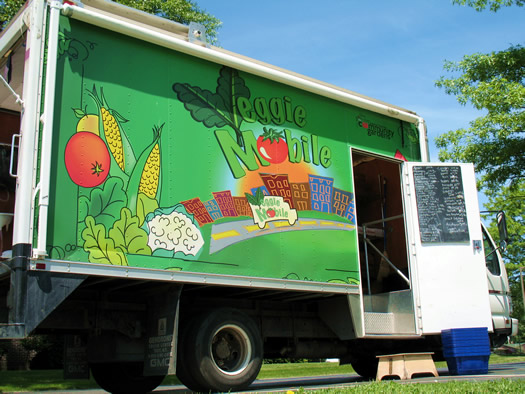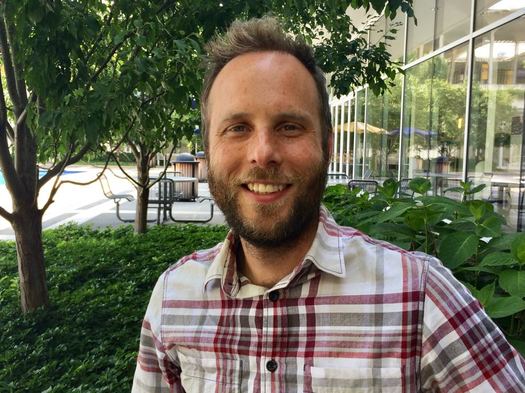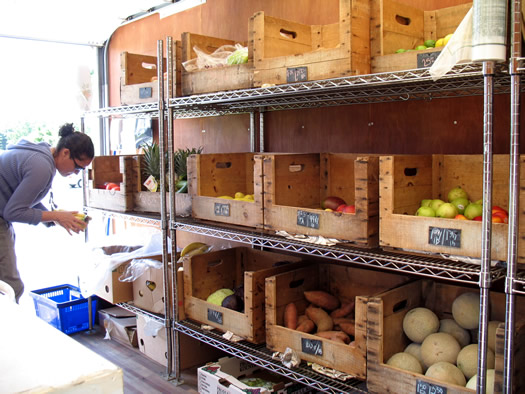Talking about the Veggie Mobile on its 10th anniversary

Capital Roots is celebrating the 10th anniversary of The Veggie Mobile -- its rolling green market on a truck -- with a party called The Big Veg this Friday, July 28 at the org's headquarters in Troy. There will be music from a bunch of acts, food trucks, and drinks.
The Veggie Mobile is an established part of the food landscape, making stops around the Capital Region each week, selling fruits and vegetables in neighborhoods that don't have easy access to such products.
But a decade ago?
"Everybody I talked with afterwards thought it was a crazy idea," Eric Krans said to us recently about taking the job back then. He helped start the program and headed it up for almost eight years.
Eric -- who's known as EJ on the Veggie Mobile -- has since moved on to a job at UAlbany, but he's still involved with Capital Roots. And he'll be playing The Big Veg as part of The Parlor, the band he and his wife, Jen O'Connor, have had for many years.
We got together with Eric to talk about the early days of The Veggie Mobile, the power of relationships, what it was like to move on from something he helped build, and what's up with The Parlor these days.
Now the Veggie Mobile is totally a regular thing. It's just like you see the Veggie Mobile and think, oh, there's the Veggie Mobile. It's just accepted. But that wasn't necessarily the case at the beginning. When you came on with Capital Roots a decade ago to start this, where did you begin, what was the thought?
So the way that it started, [Capital Roots executive director] Amy Klein read an article in a magazine that showed a mobile produce market that was from Oakland, California called The People's Grocery. And they had built it as part of trying to find the best location for a permanent brick-and-mortar storefront that they wanted to build. It lasted two years.

Eric Krans
[Capital Roots leadership] was enamored by the idea. They thought it made a lot of sense because of the communities that Capital Roots, which was Capital District Community Gardens at the time, that they serve is splintered because we live in such a region where we have, you know, a number of cities miles away from each other and the regions that Capital Roots serves tend to be, you know, in the urban areas of those cities. So the idea of setting up a storefront in one location wouldn't have necessarily made as big a difference as something like a mobile produce market. So that was the original idea.
Jen and I just got back from spending some time in Thailand. I was a teacher at the time, and I wasn't sure what I was going to do next. And somehow I found this in like Craigslist or something like that. Walked in. Apparently they they hadn't found anybody crazy enough to take on the job at the time and I was like, sure, I'll do it.
And everybody I talked with afterwards thought it was a crazy idea. And everybody said, really, it's going to take a lot of dedication, time, force of personality, all sorts of things that are like, you know, the difference between something making it and failing. Sometimes it's not about how good the idea is, it's about how much people sweat over it. And our organization put as much time and effort as we could into it. I mean we were working 70 hour weeks while we were launching the thing to push it through.
And once we put it on the street and started selling fruits and vegetables we realized that there was a huge desire for it. And there was a need for it. It was filling a need that, I don't know if you've noticed but a lot of the new supermarkets that come online don't necessarily serve the types of communities, the food desert-type communities. And so just showing up there with fruits and vegetables and selling them as cheaply as we can as a nonprofit, it was just like lightning. We just started selling and sold in a bunch of different places, pushed as hard as we could -- and made it work.
One of the interesting things about the way that you approached it, especially in the beginning, was that it wasn't just like, oh, here we are selling fruits and vegetables out of the back of a truck. It was like a whole experience with it, and that there was a real personal connection that went along with it. What was the thinking behind that?
Well, I think that when we first started selling fruits and vegetables off the back of the truck it just felt like the right thing to do.
I remember when we first pulled into, the Kennedy Towers [in Troy] was the first place we pulled into, we opened the back door and there were a bunch of people looking at a truck with this look on their face like what do we do.
And the first thing I thought to do was jump out and start shaking hands and saying, "Hello, how are you doing? My name's EJ. What's your name? Come on up, let me show you around."
And that just became the norm for us. And we made it a point to always hire people that were comfortable doing that type of activity, to jump out and say hello. And we realized that, and I think people have learned this a million times over with sales, is that a lot of times people are buying not just the product they're buying but they're buying the experience of the relationship.
So we found that to be a very positive thing. It was good for the Veggie Mobile, but also it was great for everybody working on the Veggie Mobile and all the people that we were meeting. I think we made some really good lasting relationships.
Over the almost eight years that you did this what were some of the things you think you learned about -- about the business, but also about people.
So... I feel like the thing that I would take away from the Veggie Mobile experience is the idea of growing. Growing, as like personal growth, as being something that you can you can find a mission to grow through.
We were meeting people on the truck at a place where we were, as a team, always thinking about growing. You know, trying to become better at our job. And sell more produce, make more friends. Get more people to come out to the truck. Remember more names, have more interaction. And so we were always thinking about how can we do better on our end.

And the thing we were selling to people was personal growth for them. Which we were thinking, you know, if we could get you to try something that you that you either never tried before, or better yet, something you tried that you didn't like once before. And we can get you to try it and maybe you like it this time. Then we won.
So that was like the game. And we found that it's just a really fulfilling way to make a relationship, around a work relationship for everybody on the truck, but also I think for the people we were we were selling our produce to. It was a great way to relate with people.
How hard was it to leave something that you built?
Yeah. I honestly was, I think I was depressed. I'm not the type of person to get depressed. I'm mostly a buoyant, enthusiastic person. But I didn't realize I was depressed until probably six months later. And it was just that I was getting over the fact that I had changed my life significantly. And one of the things that was most powerful in my life at that point was all the relationships, the daily interactions we were having with people that either I worked with or that we were selling fruits and vegetables to.
So not having that as a big part of my life was a difficult thing. I was staying involved in a lot of other things, but there's something magical about that daily interaction. Pulling up in a musical truck, with the music blaring and have people waiting to come on and, like, they know your name, you know their name, there is an element of Cheers to it. It's something, it's hard to walk away from it.
It's fun. It's a fun, fun thing to do. But you know, it's also tiring to be doing that for eight years straight.
So, you and Jen are going to play at this party. What do you guys have going on around your music?
Well, in the last couple of years, after we put out Wahzu Wahzu, we tried to tour and it was a little bit hard to do because a) we're not really good at planning our own tour, and b) because we were playing with five people at the time. We all had a full time job so it was a hard thing to manage.
And somebody at a talent agency heard us and asked us if we could be ready to tour in the next couple of months. And Jen and I started working on a two-person setup where we use Ableton Live, which is like a computer program for sampling music. So we figured out how to use computers to do some of our backing tracks. And then it took us about six to 12 months probably to figure that whole thing out and we finally were able to go on tour as a duo in the end of 2016.
In 2017 we spent a couple of weeks on tour out to LA and back and had a great run. And so now we're playing as a duo with electronic backing samples. It's a different sound. It's a little bit darker, and it's a little bit more... I don't know, it feels like it's a darker sound even though like Jen and I, I think, bring a light, happy feel to our music. It's nice to have that offsetting scariness in there that comes from the electronics.
You guys have been playing music for a bunch of years now together. Do you think your goals have evolved or the way you look at it has changed?
Yes. Well... no, actually. The main goal has always been to create music together.
We have a space that is very sacred to our relationship. We started before we were even dating, we were writing songs together. So that's always been a major part of our relationship. And the goal is to make sure that it stays that way forever. And in that sense, the goal hasn't changed at all. The styles of music we play have shifted drastically over the years. The way that we write together, the space that we write in, those types of things have changed. Even what we're writing about. You know we've had some periods where we've written music that's mostly just sheer joy and hopefulness. And the new record that we're putting out this coming year is mostly, it's like darker, it's about some struggles that we've had within our relationship as we get older. We've been struggling with things like infertility. And that's a much more difficult thing to sing hopefully and joyously about.
So those types of things have changed. But the goal, the main goal, stays the same.
This interview has been edited and condensed.
____
Eric said The Parlor is working on a new album and gearing up to go out on tour again in October.
The Big Veg is Friday, July 28 from 5-10 pm next to the Capital Roots Urban Grow Center (598 River Street in Troy). In addition to The Parlor, the lineup of bands includes Kimono Dragons, C.C. Vagabonds, Pony in the Pancake, Ragliacci En Masse (formerly The Lucky Jukebox Brigade), Woodchuckwood, and Chill Smith Collective.
There will be food for sale from Capital Q, Flavors of Lebanon, and Emack & Bolio's, along with beer from Rare Form and cider from Nine Pin.
Admission is free.
Say Something!
We'd really like you to take part in the conversation here at All Over Albany. But we do have a few rules here. Don't worry, they're easy. The first: be kind. The second: treat everyone else with the same respect you'd like to see in return. Cool? Great, post away. Comments are moderated so it might take a little while for your comment to show up. Thanks for being patient.
Comments
Up until the '70s there was a guy driving a pickup truck full of vegetables around a regular route in South Troy.
... said Chuck on Jul 25, 2017 at 11:13 AM | link
Exit 97.7 WEXT is proud to partner with Capital Roots for The Big Veg. We'll be there to celebrate 10 years of the Veggie Mobile, local people making a big difference.
... said Andrew Gregory on Jul 25, 2017 at 12:12 PM | link